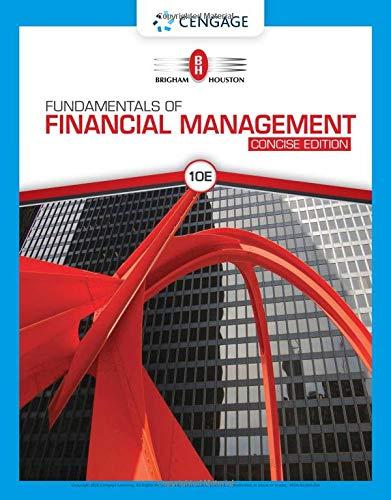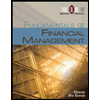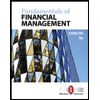Example 12.1 Suppose that the 3-year interest rate is 6% with continuous compounding. This means that 1,000e 0.06x3 = $835.27 will grow to $1,000 in 3 years. The difference between $1,000 and $835.27 is $164.73. Suppose that a stock portfolio is worth $1,000 and provides a dividend yield of 1.5% per annum. Suppose further that a 3-year at-the-money European call option on the stock portfolio can be purchased for less than $164.73. (From DerivaGem, it can be verified that this will be the case if the volatility of the value of the portfolio is less than about 15%.) A bank can offer clients a $1,000 investment opportunity consisting of: 1. A 3-year zero-coupon bond with a principal of $1,000 2. A 3-year at-the-money European call option on the stock portfolio. If the value of the porfolio increases the investor gets whatever $1,000 invested in the portfolio would have grown to. (This is because the zero-coupon bond pays off $1,000 and this equals the strike price of the option.) If the value of the portfolio goes down, the option has no value, but payoff from the zero-coupon bond ensures that the investor receives the original $1,000 principal invested.
Example 12.1 Suppose that the 3-year interest rate is 6% with continuous compounding. This means that 1,000e 0.06x3 = $835.27 will grow to $1,000 in 3 years. The difference between $1,000 and $835.27 is $164.73. Suppose that a stock portfolio is worth $1,000 and provides a dividend yield of 1.5% per annum. Suppose further that a 3-year at-the-money European call option on the stock portfolio can be purchased for less than $164.73. (From DerivaGem, it can be verified that this will be the case if the volatility of the value of the portfolio is less than about 15%.) A bank can offer clients a $1,000 investment opportunity consisting of: 1. A 3-year zero-coupon bond with a principal of $1,000 2. A 3-year at-the-money European call option on the stock portfolio. If the value of the porfolio increases the investor gets whatever $1,000 invested in the portfolio would have grown to. (This is because the zero-coupon bond pays off $1,000 and this equals the strike price of the option.) If the value of the portfolio goes down, the option has no value, but payoff from the zero-coupon bond ensures that the investor receives the original $1,000 principal invested.
Fundamentals Of Financial Management, Concise Edition (mindtap Course List)
10th Edition
ISBN:9781337902571
Author:Eugene F. Brigham, Joel F. Houston
Publisher:Eugene F. Brigham, Joel F. Houston
Chapter9: Stocks And Their Valuation
Section: Chapter Questions
Problem 5TCL
Related questions
Question

Transcribed Image Text:Example 12.1
Suppose that the 3-year interest rate is 6% with continuous compounding. This
means that 1,000e 0.06x3 = $835.27 will grow to $1,000 in 3 years. The difference
between $1,000 and $835.27 is $164.73. Suppose that a stock portfolio is worth
$1,000 and provides a dividend yield of 1.5% per annum. Suppose further that a
3-year at-the-money European call option on the stock portfolio can be purchased
for less than $164.73. (From DerivaGem, it can be verified that this will be the
case if the volatility of the value of the portfolio is less than about 15%.) A bank
can offer clients a $1,000 investment opportunity consisting of:
1. A 3-year zero-coupon bond with a principal of $1,000
2. A 3-year at-the-money European call option on the stock portfolio.
If the value of the porfolio increases the investor gets whatever $1,000 invested in
the portfolio would have grown to. (This is because the zero-coupon bond pays
off $1,000 and this equals the strike price of the option.) If the value of the
portfolio goes down, the option has no value, but payoff from the zero-coupon
bond ensures that the investor receives the original $1,000 principal invested.
Expert Solution
This question has been solved!
Explore an expertly crafted, step-by-step solution for a thorough understanding of key concepts.
Step by step
Solved in 2 steps with 1 images

Recommended textbooks for you

Fundamentals Of Financial Management, Concise Edi…
Finance
ISBN:
9781337902571
Author:
Eugene F. Brigham, Joel F. Houston
Publisher:
Cengage Learning

Fundamentals of Financial Management, Concise Edi…
Finance
ISBN:
9781285065137
Author:
Eugene F. Brigham, Joel F. Houston
Publisher:
Cengage Learning

Fundamentals of Financial Management, Concise Edi…
Finance
ISBN:
9781305635937
Author:
Eugene F. Brigham, Joel F. Houston
Publisher:
Cengage Learning

Fundamentals Of Financial Management, Concise Edi…
Finance
ISBN:
9781337902571
Author:
Eugene F. Brigham, Joel F. Houston
Publisher:
Cengage Learning

Fundamentals of Financial Management, Concise Edi…
Finance
ISBN:
9781285065137
Author:
Eugene F. Brigham, Joel F. Houston
Publisher:
Cengage Learning

Fundamentals of Financial Management, Concise Edi…
Finance
ISBN:
9781305635937
Author:
Eugene F. Brigham, Joel F. Houston
Publisher:
Cengage Learning

EBK CONTEMPORARY FINANCIAL MANAGEMENT
Finance
ISBN:
9781337514835
Author:
MOYER
Publisher:
CENGAGE LEARNING - CONSIGNMENT

